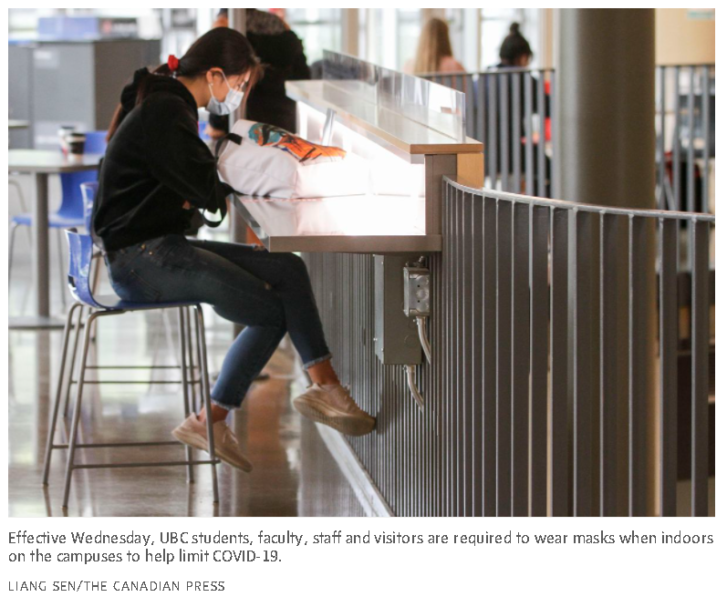Major universities in Western Canada are still tinkering with the mechanics of their coronavirus vaccination and testing requirements for students, faculty and staff, even though classes resume next week and infections are climbing across the continent.
The University of British Columbia, for example, said this past week it will require COVID-19 tests for students, faculty and staff who are not vaccinated, but the school has not said when the screening program will start or how it will work. At the University of Saskatchewan, those who are unvaccinated or prefer not to disclose their status will have to submit two negative COVID-19 rapid tests weekly, starting Sept. 13. However, the school has not yet released details about how the tests will be administered.

Faculty members across Western Canada pressured postsecondary institutions to limit access to their campuses to only those who are vaccinated against COVID-19, or test negative for the virus. But while major universities have announced such plans, unanswered questions remain, particularly around compliance and consequences.
UBC, for example, has not determined whether students who do not comply with its vaccination and testing policies will be able to attend classes in person. Further, while USask and the University of Regina require proof of vaccination, other schools such as the University of Alberta will rely on self-declarations or have not provided complete details. Some professors still uncomfortable with their school’s safety protocols have ditched in-person classes in favour of online learning, upsetting students who feel blindsided by last-minute swaps.
The Research Universities’ Council of British Columbia, which represents six major universities in B.C., this past week said it was working to provide COVID-19 tests to those who are not vaccinated or will not reveal their information. UBC has since said it will “require” people on campus to take a COVID-19 test if they are not vaccinated, but it is unclear what will happen to those who fail to meet this demand.
“That is part of the program that we need to consult with our people on – our student groups, our faculty, and our employee groups – before we can come out definitively and say: ‘This is what happens to you if you don’t,’” UBC spokesman Matthew Ramsey said Sunday.
Bonnie Henry, B.C.’s Provincial Health Officer, has previously said vaccine mandates are unnecessary in postsecondary institutions. Her office did not respond to questions, submitted Friday, about the research universities’ vaccine and testing announcement.
UBC is working with other postsecondary institutions to purchase testing supplies, Mr. Ramsey said. It will cover the costs of the tests, he said.
Hallie Brodie, a spokeswoman at the University of Alberta, said the provincial government is supplying her institution COVID-19 tests “free of cost.” The kits will underpin the school’s testing and vaccination policy, even though the provincial government discourages organizations from insisting on immunization mandates. Alberta Health is providing the supplies as part of its rapid testing program, Ms. Brodie said, where employers and service providers can apply for free test kits for COVID-19 screening programs.
The University of Calgary did not say who is picking up the tab for its kits, although on Friday it said students, faculty and staff in its testing program will receive take-home kits free of charge. The University of Lethbridge intends to implement a similar testing standard for those who are not vaccinated. It did not return messages seeking comment.
The universities that have announced testing and vaccine requirements note their communities tend to have high rates of immunizations. In Alberta, for example, about 54 per cent of people between 20 and 29 are fully vaccinated. By way of comparison, the University of Calgary, at the beginning of August, said 84.8 per cent of students who participated in a survey said they were fully vaccinated, and another 7.5 per cent planned on getting both shots by the time school starts.
Demand for COVID-19 shots has increased in provinces that have said people without proof of vaccine will not be able to access non-essential services. On Wednesday, 19 to Zero, an organization advocating for immunization, will set up a mobile vaccination clinic at the University of Calgary.
In order to receive an exemption to the U of C’s testing requirements, individuals on campus must be vaccinated with shots approved by Health Canada. This means some international students vaccinated in their home countries will not immediately meet the standard. Some universities are signing off on doses approved by the World Health Organization, which expands the list of acceptable vaccines.
Monica Prendergast, the vice-president of the University of Victoria Faculty Association, said that while her organization is pleased B.C.’s research universities are inching toward testing and vaccination requirements, the dearth of details is concerning.
“We just are in a kind of purgatory right now,” she said.
Article From: Globe and Mail
Author: CARRIE TAIT

